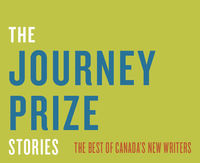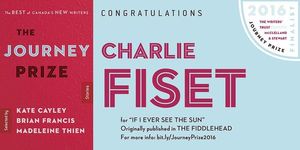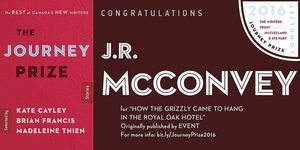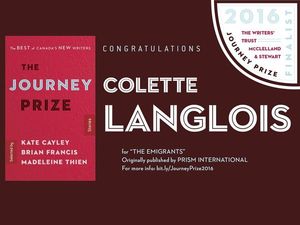The Journey Prize Writers
The 2016 Writers’ Trust / McLelland & Stewart Journey Prize, the winner of which will be announced on November 2, may be slightly overshadowed by the other prizes given out that night: namely, the Hilary Weston Nonfiction Prize and the Rogers Writers’ Trust Fiction Prize, both of which present slightly larger purses to more established authors. But the Journey’s the one that I watch and most look forward to, partially because I owe the early attention that my writing got to my own Journey experience in 2013. (I also really, really needed the prize money, my god did I need it, and that is a part of literary prize culture that matters as well).
The major reason that the Journey is worth following, though, is the annual anthology M&S compiles of each year’s 12 selected stories. The book, selected this year by judges Kate Cayley, Brian Francis, and Madeleine Thien serves as a talent index of new Canadian writers of all ages. The table of contents heralds names that we’ll see on the front covers of collections and novels in the coming months and years. I talked to this year’s three finalists about their stories, touching on the excitement of nomination, but mostly discussing their diverse and fascinating works.
Ruthnum:
Charlie Fiset’s story “If I Ever See The Sun” takes place underground, following miner Roxane through a mythological structure that is anchored to the extremely practical demands of her family life and the constant shit she has to deal with from her co-workers.
You've got some deep research going here, or you've been a miner, or you’ve had them in your family. How did you accumulate all of these enlivening details?
Fiset:
I’ve never been underground despite coming from a family of four generations of northern Ontario gold miners. I kept going back to my dad with questions so I could understand that world through the experiences of someone who’s spent thirty years in the dark. Some of the material comes from true anecdotes; for example, the scene where Wycliffe forgot to unclip his safety lanyard before driving away in a Kubota is based on a similar accident my dad lived through.
Other parts come from northern Ontario mining folklore. A couple decades ago, a local miner claimed to have seen the devil underground in what was then one of the deepest mines in the world. He was an otherwise credible person so, for safety reasons, management ended up stopping production to search the mine for Satan. They didn’t find him. This story made me wonder what it would take to make an ordinary person witness such a dark epiphany, and it led me to question what effect an unnatural environment could have upon an unsettled mind.
Ruthnum:
As with any story that largely takes place in darkness, there are some horrifying scenes in here, particularly the one in which Roxane's headlamp is shattered after she's lured in by the "to me" gesture. There's also an overarching whodunit-type plot in the story. Do you have any genre influences, in particular? (An aside: If you haven't seen the caving horror film The Descent, please do).
Fiset:
My story is an attempt at a Gothic retelling of the myth of Demeter and Persephone as written in The Homeric Hymn to Demeter. While it was influenced by the ambiguous hauntings in classic Gothic works, I was most moved by the way the women characters within the Hymn had such an intensely psychological reaction to the apocalyptic threat to regeneration represented by Persephone’s imprisonment within the House of Hades. The complex women of the myth experience fear, depression, and guilt in response to the dying Earth while resisting the lack of agency sometimes seen in stories that link women to ecology. While the Hymn is known for telling one of the earliest underworld descent stories, I think it could also be called the original ecological Gothic. Because the story is told through the eyes of a gold-miner, I wanted to create a sense of the characters’ conscious and subconscious awareness of the mythic themes lurking beneath the surface of everyday life.
(Also: I would watch The Descent just to see how they handle what Wikipedia calls the “troglofaunal flesh-eating humanoids.”)
Ruthnum:
Are you enjoying the Journey process? What are your next writing steps after the November ceremony?
Your CanLit News
Subscribe to Open Book’s newsletter to get local book events, literary content, writing tips, and more in your inbox
Fiset:
I cannot give enough thanks to Kate Cayley, Brian Francis, and Madeleine Thien for the confidence they have given me in my work. Last year’s experience with the the Journey Prize opened up my world, and this year I feel like I’ve been living in a haze of possibility that has been both harrowing and joyful. Before finding out I was a finalist, I’d been planning to work on my novel for the winter. Now I’ll settle in with the hope that there are some good seeds sleeping under the snow.
Ruthnum:
J.R. McConvey’s “How the Grizzly Came to Hang In the Royal Oak Hotel” tells the story its odd title announces, giving us an Afghanistan war vet protagonist whose vision is slightly disconnected from the real undergoing an experience that even a completely trauma-free narrator would have trouble describing.
When it comes to some of the logistical details of the story—the guns used for the grizzly confrontation, the general way that bear-wrangling works on film sets—the details don't sync up with reality. But I got the sense that this wasn't important to the story. Is your blurring of realism in these details a pointed act?
McConvey:
Absolutely. I have a general aversion to strict realism – I think it’s a bit of a wasted opportunity. (I’m thrilled that both of the other shortlisted stories lean toward the speculative or the uncanny.) In a lot of my stories, I’m looking to get to a place where reality and dream (or psychosis or hallucination) collide and mix to create a reading space with a tinge of the surreal. I think of this quality in prose as “float”—a kind of in-between. Sometimes this works in my favour. Sometimes it’s a terrible idea. In this particular instance, it made sense to me, in that the story is fundamentally about the damaged lens through which one character perceives the civilian world. The narrator states right off the top that, at the time of the bear incident, he still had a loose hold on reality. Since everything is told from his perspective—and as a memory—it’s natural that things might get exaggerated, or absurd. In a way, he’s in a state of perpetual incongruity, a man whose identity has been defined by war and becomes uncertain or unstable outside of that context, which he can never go back to.
Ruthnum:
There's a larger soldiers-and-generals metaphor about war underlying the story, but you never make it annoyingly overt. Was this a tough balance to strike?
McConvey:
Not really—again, because of the narrator. It was important for me to try and keep the military metaphor half-buried, because for that character, acknowledging it outright would be a kind of insubordination, which isn’t in his programming. He does what he’s told, without vocal objection, even if it’s ludicrous. Or worse. That’s who he is, what he’s been made into.
Ruthnum:
Did you go through multiple drafts to get the story this short and tight? Is brevity something you strive for in most of your short stories?
McConvey:
I went back and checked this, because often I’ll go through like twelve drafts of a thing, trying to wrestle it down to a manageable size before I’m (sort of) satisfied with it. But this one came quickly, the bulk of it in one go, without ever threatening to spiral off into many thousands of words. I think it’s because of the form of the story, which is basically a long anecdote. And using that Munro-ish coda thing at the end created a sense of compression, which quieted my need to elaborate.
Ruthnum:
How’s the Journey process been so far?
McConvey:
It’s been a thrill and a privilege to be involved with the Journey Prize. I feel very grateful. It’s made me appreciate the commitment it’s entailed, from a variety of people, to keep it going for 28 years. I’m hoping it will help me take the next steps as a writer—get an agent, find the right publisher for my novel and story collection—but I also appreciate the process in itself, for the beautiful validation it offers. I’ve never been to a gathering of writers, strictly as a writer. That’s a big deal for me.
Ruthnum:
Colette Langlois’s "The Emigrants" fits both historical and speculative fiction into its brief length, looking forward then backward in alternating passages.
Your story draws on science-fiction—I know these genre designations can get boring, of course, but do you think there's an aim you have in the Mars passages of "The Emigrants" has that pulls it away from SF?
Langlois:
"The Emigrants" came out of ideas I had for two different stories. One was about a historical fiction character I wanted to explore, and the other was about the experience of communicating without knowing if anyone will receive the message. It was only after I started writing the two pieces that I realized there were some common elements to the two characters’ situations, and that it might be interesting to build on those connections and have them in the same story. I also never set out to write a science fiction piece at all: I began with an image of someone’s finger hovering over a send button, and an image of someone breathing on carrot tops, and the entire Mars setting grew around that because it seemed like a place where extreme isolation could happen. The choices about setting and form were driven by where the characters were going in their inner worlds, and I wasn’t really thinking much about genre while I was writing - it was almost incidental. If there is something that pulls The Emigrants away from other speculative fiction maybe that’s it.
Ruthnum:
The details of James's Mars burial, the broken knees in particular, made for a vivid sequence. I'm curious, was this purely an act of imagination on your part, or did you do some research on burial practices?
Langlois:
I didn’t do any research on burial practices, and most of that sequence was imagined. The idea for her to jump on James' knees did come from a real event - when the Mad Trapper of Rat River died he froze with his knees up in a fetal position, and they had to break his legs to fit him into a coffin. Something about that part of the Mad Trapper’s story is really moving to me - maybe it's the brutality of the practical demands of the physical world in the face of all the emotion and spirituality around death. I wanted to bring that into CMB’s story.
Ruthnum:
Doing away with Earth is a startling move, and the fact that our planet explodes more-or-less offstage, appearing as a detail in the Martian survivor's life, is a touch that's delicate, thrilling, and quite darkly funny. How did you arrive at this moment in the narrative?
Langlois:
At the beginning of the Mars story, CMB is dealing with being the last survivor of the colony, failing communications equipment, and the knowledge that no one on Earth has responded to the colony's messages in several years, and yet to me despite her anger and frustration with “Headquarters”, she has a kind of relentless optimism and sense of purpose. I wanted to push that, and making the possibility of any further human contact go from unlikely to near impossible felt like an appropriate next step.
Ruthnum:
A Journey finalist with your first publication! How has the process been? What are your writing and publishing aims after the November ceremony?
Langlois:
The news that The Emigrants was long-listed for the prize was completely unexpected because I didn’t even know it had been nominated! I felt tremendously honoured it got that far, and never thought it would also make the short-list. One of the best parts is getting to meet other finalists for this and other Writers’ Trust of Canada prizes in November - I am really looking forward to that.
I have been working on more stories, including some about the characters and families in The Emigrants, and hope at some point to publish them as a collection. There is also a novel set in prehistoric East Africa I have been wrestling with for a few years, but I am taking a break before I go another round with that one.
Ruthnum:
You're pursuing an MSc--may I ask what you're studying? Is there any overlap between your research and your writing?
Langlois:
My MSc is in Rehabilitation Science, and my research has to do with speech disorders in children with Down syndrome and children with cerebral palsy. So no, no connection to my fiction writing ... so far. :)
Naben Ruthnum lives in Parkdale, where he writes literary and genre fiction. He also writes criticism, and was last year's Crimewave columnist at the National Post. Naben won the 25th annual Journey Prize for his short story, Cinema Rex, and continues to publish widely.
Ruthnum's essay, CURRY: Eating, Reading and Race, will be published by Coach House Books as part of their Exploded Views Series.





